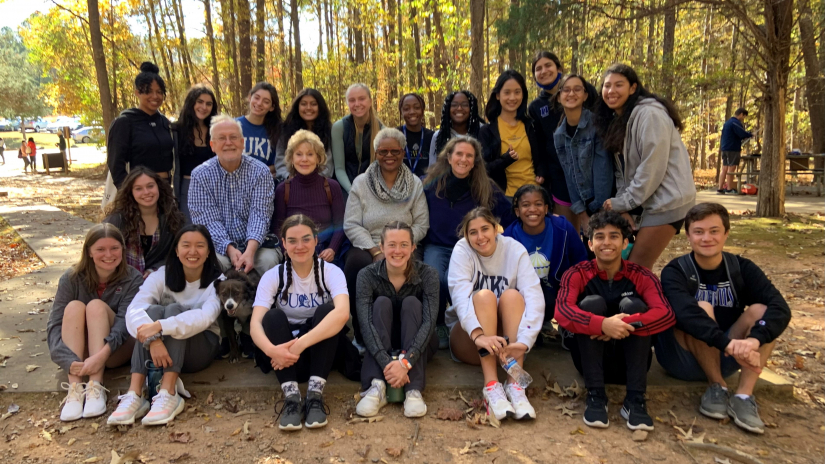Knowledge in the Service of Society
Overview
You are at an exciting transition point in your life, envisioning your future as you begin your Duke journey. How are you creating your story? What elements important to your identity will flourish? What aspects do you hope to change?
Planning for 2030, the University has laid out an approach to partnering with our community, predicated on the identification of community priorities, and …the harnessing of resources to address community priorities through sustained, equitable engagement.
In our FOCUS cluster, our vision is the pursuit of scholarship and engagement based in Knowledge In the Service of Society (KISS). To serve our community, we first need to understand it better. We begin by immersing ourselves in the history of this community and how knowledge informs service to our community. Our KISS cluster includes service-learning courses that engage with Durham and Durham's stories. Our guiding theme, “My Story, Your Story, Our Story,” invites exploration of your story in relation to our cluster’s stories in relation to Durham’s stories and beyond. While understanding the communities we serve, we encourage you to understand your agency in crafting your own story at Duke.
The pursuit of knowledge is an ongoing journey that requires dedication, curiosity, and, most importantly, open-mindedness. Knowledge is used to help navigate stories and make informed life decisions, personally and professionally. Join us in continuing your story!
Courses
Education 209FS/ Documentary Studies 209FS/ Visual Arts 212FS/ Visual and Media Studies - Digital Photography: Education, Childhood and Growth (CE)

Susie Post-Rust, Lecturing Fellow of Documentary Studies
Few experiences are more vital than childhood or more reflective than retirement. Using digital photography and a documentary approach, students document one of Durham's public schools or the Croasdaile Village Retirement Community. Students learn to use cameras, and through a semester-long project explore meaningful topics, give voice to subjects, and think about issues that grow out of change. Collectively the students’ body of work portrays the life of the school and community, and in so doing, mirrors course content across the FOCUS cluster. As part of Service-Learning, culmination of the class includes a student exhibit and website launch that takes place publicly at the school; prints and the project website reside at the school. Course includes discussion on ethics in documentary photography, basic camera usage, Photoshop, narrative storytelling, and dissemination. Service-Learning Course (SLCE).
Education 118FS - The Inequities of Race and Class in Education, Health Care, and Housing (IJ, SB)

Zoila Airall, Adjunct Associate Professor of Education
This class will consider the complicated multiple dimensions of oppression that privilege some in our society and disadvantage others. Those dimensions include the individual, the institutional, and the social/cultural. There are also unconscious and conscious dimensions that allow us to understand how oppression is intentional and unintentional. The dimensions of attitudes and behaviors are the norms, practices, policies, laws, values, beliefs, and customs that show us how oppression is demonstrated.
We will interview members of a retirement home as the Service-Learning component of the course, using critical race theory to understand how these members have been privileged or disadvantaged in their educational, medical, and housing experiences throughout their lives.
Education 111FS - Pursuit of Equality: Rethinking Schools-Lens of Social Justice (IJ, SB)

Amy Anderson, Assistant Professor of the Practice of Education
In 1954 the Supreme Court case Brown versus the Board of Education forever changed American schools by ending segregation and creating educational equity. Or did it? Are today's schools any more inclusive or socially just than schools were 50 years ago? Examination of ways schools may or may not perpetuate and reproduce social inequities. Focus on recent efforts to imagine and create socially-just schools. Discussion of our ethical responsibilities as civically engaged citizens to work towards educational equality and provide support of schools that are inclusive, culturally responsive, and democratic. Required service-learning experience working with children in a Durham public school. Service-Learning Course (SLCE).
Education 189FS—Artificial Intelligence, Information Literacy, and Decision-Making in Higher Education ()

Jennifer L. Hill, Ed.D., Director, Office of Assessments
This course considers the opportunity and problem of artificial intelligence in complex organizations, exploring variants of the question, does weak/narrow AI help or hurt us? AI is transforming how we cultivate and process information, and it brings varying types and degrees of risk. Invoking organizational and education theories, we evaluate the impacts of AI on the missions of higher education: learning with integrity, facilitating research and discovery, and using evidence to make good decisions for the community. Important parallel themes include technology development and adoption, resource costs, AI literacy and fluency, and the matter of "big data" in education.

















